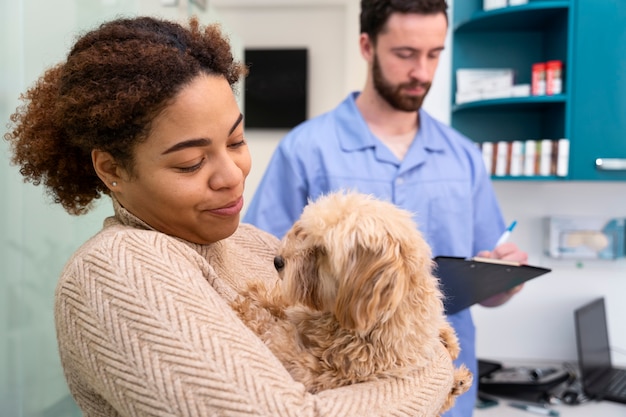Coughing Dogs and Cats: When to See Your Vet


Coughing Dogs and Cats: When to See Your Vet
Is your dog or cat suddenly coughing more than usual? Hearing your beloved pet cough can be unsettling, especially if the sound lingers or seems to worsen. Coughing in pets is a symptom that can range from a minor irritation to a sign of something more serious. At Rapides Animal Medical Center, located at 5990 Jackson Street, Alexandria, LA 71303, we understand how worrying it is to see your pet uncomfortable or struggling to breathe. Whether your companion is a playful puppy, a senior cat, or anything in between, knowing when a cough signals the need for professional care is crucial for their wellbeing.
In this blog, we'll help you understand common pet coughing symptoms, explore what might cause your dog or cat to cough, and explain when it’s time to schedule an appointment with your veterinarian. You'll also learn about our diagnostic capabilities and how our veterinary team supports pet respiratory health in Alexandria and surrounding communities. If you are searching for pet diagnostics in Alexandria or wondering if it’s time to reach out to a "vet near me," you’re in the right place. Our goal is to provide practical, compassionate guidance so you can make the best decisions for your furry family members.
Recognizing Coughing in Dogs and Cats: What Pet Owners Should Watch For
Coughing in pets can be a confusing symptom, as it varies in sound, frequency, and severity. Some dogs make a harsh, hacking noise, while others may have a softer, more subtle cough. Cats, on the other hand, often cough less frequently, so any cough in a feline should be taken seriously. Understanding these differences can help you decide if your pet’s cough is a passing irritation or a reason to contact your veterinary team.
Key pet coughing symptoms include persistent coughing that lasts more than a day or two, coughing that disrupts rest or sleep, and coughing accompanied by other symptoms such as sneezing, nasal discharge, loss of appetite, or lethargy. Other warning signs are coughing that produces foam, blood, or mucus, as well as any signs of breathing difficulty such as rapid, shallow breaths, open-mouth breathing, or exaggerated chest movements. In some cases, a cough may sound dry and hacking, while in others it may be moist or even honking in nature. If your pet seems anxious, weak, or has collapsed, this is an emergency and you should seek veterinary care immediately.
If you’re unsure whether your pet’s cough warrants a visit, remember that even mild symptoms can sometimes be the first sign of an underlying condition. Scheduling a wellness examination is a proactive way to ensure your pet’s health is thoroughly evaluated, especially if you live in Alexandria or are searching for veterinary services near me.
Why Do Pets Cough? Common Causes for Coughing in Alexandria and Surrounding Areas
Coughing in dogs and cats can have many causes, some minor and others more serious. In Alexandria and the surrounding central Louisiana region, pets are exposed to seasonal allergens, humidity, and infectious diseases that may contribute to respiratory issues.
Infectious causes are common, such as kennel cough in dogs, which is a contagious upper respiratory infection often contracted in boarding or grooming facilities. Feline upper respiratory infections can also cause coughing, especially in multi-cat households or shelters. Heartworm disease is another concern in our region, particularly as mosquitoes thrive in the Louisiana climate; coughing can be an early warning sign of heartworm infection in both dogs and cats.
Irritants in the environment may lead to coughing, including smoke, dust, pollen, or strong cleaning chemicals. Structural problems like collapsing trachea in small dog breeds, or chronic bronchitis, may result in a persistent cough. Heart disease, especially in older pets, can cause fluid accumulation in the lungs, leading to a soft, wet cough. Less commonly, coughing may indicate more serious problems such as pneumonia, foreign objects lodged in the airway, or even certain types of cancer.
Understanding the underlying cause is essential for effective treatment. If you notice your pet coughing and are searching for pet diagnostics near me or quality veterinary services near me, our veterinary professionals are equipped to perform a thorough evaluation and recommend the right course of action.
How Coughing in Pets is Diagnosed and Treated at Rapides Animal Medical Center
When your pet arrives for a coughing concern, our veterinary team begins with a full physical examination and a detailed history of your pet’s symptoms. We may ask about the duration and frequency of the cough, any recent exposure to other animals, environmental changes, and whether you’ve noticed additional symptoms such as fever or loss of appetite.
Diagnostic approaches for pet coughing symptoms in Alexandria include listening to your pet’s lungs and heart, and may involve advanced tools such as digital radiology, ultrasound, or laboratory testing. Chest x-rays can reveal lung infections, heart enlargement, or masses, while blood tests can help identify infections or systemic conditions. Our in-house pet diagnostic laboratory services enable fast, accurate results, providing answers when you need them most.
Treatment options depend on the diagnosis. For infections like kennel cough or feline respiratory disease, supportive care and sometimes medications are prescribed. Heartworm disease requires specific treatment protocols that may be lengthy, so early diagnosis is important. Chronic conditions such as bronchitis or heart failure are managed with medications and lifestyle adjustments. In the case of foreign body inhalation or tumors, surgery might be necessary. Throughout, our goal is to keep your pet comfortable, address the underlying cause, and support their recovery with compassionate care.
Our veterinary diagnostics in Alexandria are designed to give pet owners clarity and peace of mind. If you need more information on our imaging options, our digital radiology services provide detailed views of your pet’s chest and lungs, which can be vital in diagnosing persistent coughs.
What Can Pet Owners Do at Home? Prevention and Supportive Care
While not every cough requires immediate veterinary intervention, there are important ways you can support your pet’s respiratory health at home. Reducing exposure to smoke, aerosols, and harsh cleaning chemicals helps minimize irritation. Keeping your home free of dust and using air purifiers can be especially helpful for pets with allergies or sensitive airways.
Ensuring your dog or cat is up to date on vaccinations is one of the best ways to prevent infectious respiratory diseases. For dogs, kennel cough and canine influenza vaccines are recommended, particularly if your pet frequents boarding or grooming facilities. Heartworm prevention is essential year-round in Alexandria due to our climate and mosquito population; your veterinarian can advise on the best regimen for your pet.
Monitor your pet closely for worsening symptoms. If coughing becomes more frequent, your pet seems weak, stops eating, or develops breathing problems, it’s important to contact your veterinarian promptly. Never attempt to medicate your pet with over-the-counter cough remedies meant for humans, as these can be dangerous or mask serious conditions.
If you’re concerned about pet diagnostics near me or have questions about preventive care, the Rapides Animal Medical Center team is here to help you create a personalized wellness plan that keeps your pet healthy and comfortable.
When to Call the Vet: Recognizing Urgent Pet Coughing Symptoms
Knowing when to call the vet can make a significant difference in your pet’s outcome. Prompt veterinary attention is critical if your pet is struggling to breathe, coughing up blood or foam, or has collapsed. Other signs that warrant immediate evaluation include open-mouth breathing, blue or pale gums, or coughing that is persistent and unresponsive to home care.
For less urgent but ongoing symptoms, such as a mild cough lasting more than a few days, changes in appetite, or increased lethargy, it’s still important to schedule an appointment for a comprehensive pet exam. Early intervention often leads to better outcomes, especially for conditions like heartworm disease or chronic bronchitis that benefit from timely management.
If you’re searching for a veterinarian near me or need veterinary diagnostics in Alexandria, rest assured that our veterinary team is equipped to handle a wide range of respiratory concerns. Our team is committed to clear communication and compassionate care every step of the way.
The Importance of Local Veterinary Care and How to Reach Us
As a trusted resource for pet families in Alexandria and surrounding communities, Rapides Animal Medical Center is dedicated to providing thorough, personalized care for every pet cough concern. Our comprehensive approach includes state-of-the-art diagnostic tools, preventive wellness care, and treatment plans tailored to your pet’s unique needs. We understand that finding a quality vet near me is a top priority for pet owners, especially when symptoms arise unexpectedly.
Whenever you notice changes in your pet’s breathing or coughing, don’t hesitate to reach out. Early assessment by our veterinarians can mean faster relief and peace of mind for you. To schedule an appointment or discuss your concerns, contact us at (318) 445-5245 or visit our 5990 Jackson Street, Alexandria, LA 71303 location. If you have questions about our capabilities, learn more about our pet diagnostic laboratory services or digital radiology services online.
Your pet’s health and comfort are our highest priorities. With our friendly, knowledgeable veterinary professionals and advanced veterinary diagnostics in Alexandria, we are here to support you and your pet through every cough, sneeze, and wag of the tail. Schedule your visit today and experience the difference of a truly caring veterinary team.
Disclaimer: This article is for informational purposes only and does not replace professional veterinary care. If your pet is experiencing severe symptoms or respiratory distress, contact your veterinarian immediately.


















